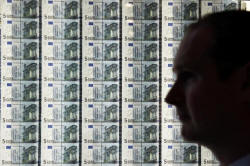Yen hits five-month high as dollar extends fall
 Send a link to a friend
Send a link to a friend
 [February 13, 2018]
By Tommy Wilkes [February 13, 2018]
By Tommy Wilkes
LONDON (Reuters) - The Japanese yen rose to
a five-month high on Tuesday on the back of broad-based selling of the
dollar and speculation the Bank of Japan could be close to dialling back
record levels of monetary stimulus.
The yen has gained 1.5 percent against the dollar <JPY=> this month,
benefiting last week from a rush by investors into currencies deemed
safer amid the rout in equity markets.
But while risk appetite has recovered this week, investors have
continued to sell dollars and buy yen. The dollar was down as much as
half a percent against a basket of currencies <.DXY>, reversing some of
its gains of last week, when it enjoyed its best performance since 2016.
"A lot of people in the market are expecting the yen to rise, because a
turnaround in BoJ monetary policy has not been priced in," Ulrich
Leuchtmann, a Frankfurt-based analyst at Commerzbank said.
Leuchtmann said that he did not subscribe to the view that the BoJ would
follow other central banks in gradually ending the era of easy money
anytime soon, but it helped explain the move.

Many traders betting against the yen were also likely stopped out as the
yen passed the 108 yen versus the dollar mark, exacerbating Tuesday's
rally, Morten Helt at Danske Bank said.
The yen rose as much as 1.1 percent to 107.42 yen, close to the high it
hit in September at 107.32 yen. If the yen breaks through that, it will
hit its best level since late 2016.
The yen also gained 0.5 percent versus the euro to 132.83 yen <EURGBP=>
after earlier rising to as high as 132.52 yen.
The gains came despite Japanese government leaders reaffirming their
confidence in Bank of Japan Governor Haruhiko Kuroda on Tuesday,
bolstering expectations that he will be reappointed for a rare second
term and a sign that ultra-loose monetary policy will remain in place.
EURO RISES; EM TREAD WATER
Elsewhere, the euro rose to a daily high of $1.2351 <EUR=>, up 0.5
percent, as gains in global equity markets encouraged traders to sell
the dollar and tiptoe back into riskier assets.
[to top of second column] |

A man is seen in front of a sheet of five Euro notes at the opening
of the new Central Bank of Ireland offices in Dublin, Ireland April
24, 2017. REUTERS/Clodagh Kilcoyne

"It's an interesting combination of the return of risk appetite and U.S.
bond yields also dragging the dollar," said Alvin Tan, London-based FX
strategist at Societe Generale, adding there was little euro-specific
news to push the single currency higher.
A sharp sell-off in stock markets last week drove traders to unwind one
of the most popular bets of the year - buying the euro on expectations
the European Central Bank will scale back its stimulus later this year
amid a strong recovery in the bloc's economy.
Although many market players remain bullish on the euro, the currency
lacks clear catalysts for further gains as a March election in Italy and
a fragile coalition deal in Germany create an uncertain political
backdrop.
Though risk appetite appears to be recovering, emerging market
currencies that sold off last week failed to make much headway, with the
Turkish lira <TRY=>, Mexican Peso <MXN=> and Russia's rouble <RUB=> all
treading water.
The commodity-linked Australian <AUD=> and Canadian <CAD=> dollars were
also trading flat.
Prospects of higher inflation globally have rattled investors this month
and have helped drive equity market falls.
"Market sentiment is still fragile," Tan said.
The South African rand <ZAR=D3> briefly gained after the ruling African
National Congress party executive committee decided to remove President
Jacob Zuma as head of state.
For Reuters Live Markets blog on European and UK stock markets see
reuters://realtime/verb=
Open/url=http://emea1.apps.
cp.extranet.thomsonreuters.biz/cms/?pageId=livemarkets
(Editing by Robin Pomeroy)
[© 2018 Thomson Reuters. All rights
reserved.] Copyright 2018 Reuters. All rights reserved. This material may not be published,
broadcast, rewritten or redistributed.
Thompson Reuters is solely responsible for this content. |